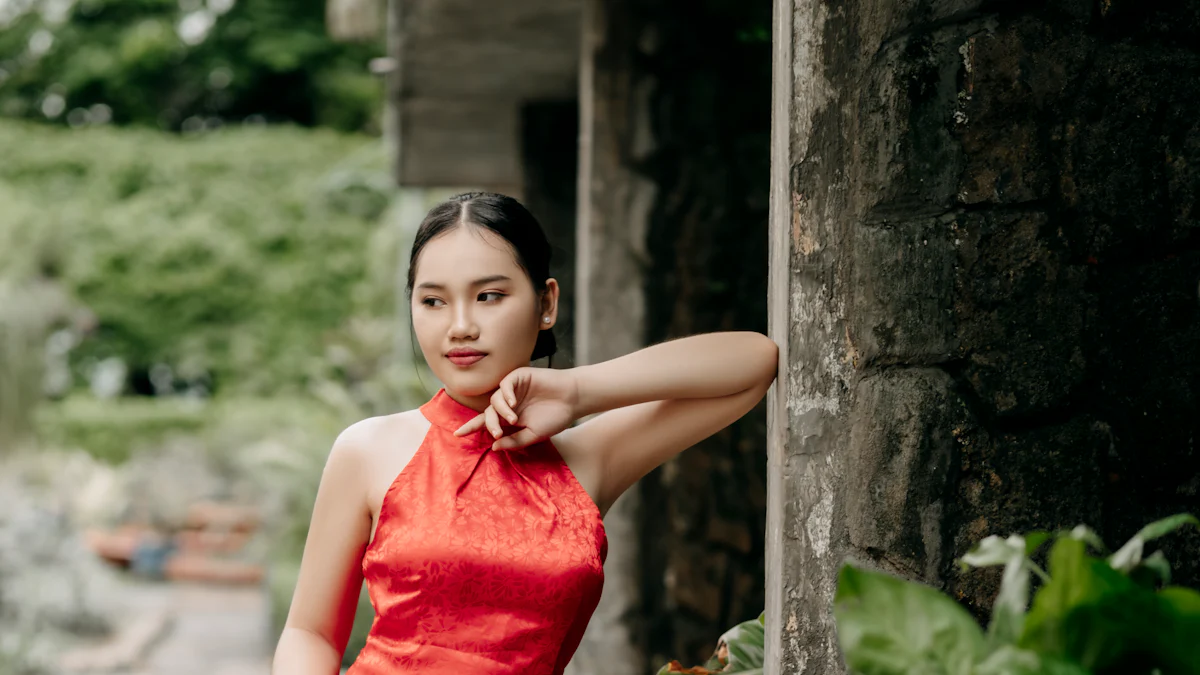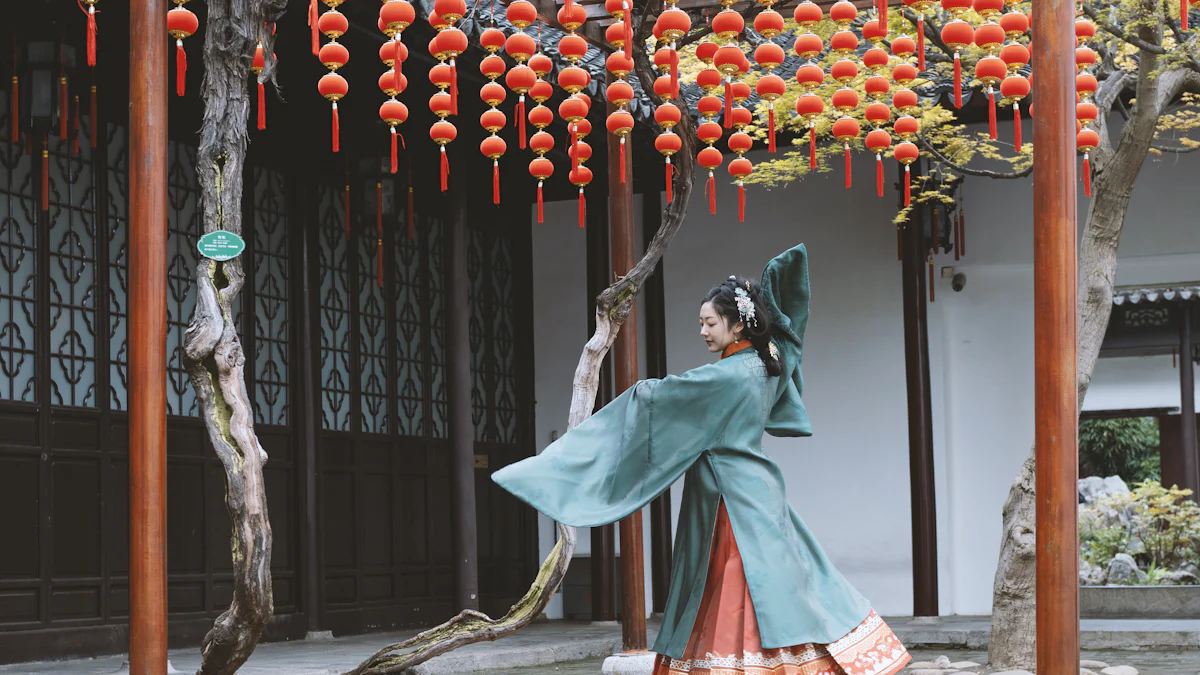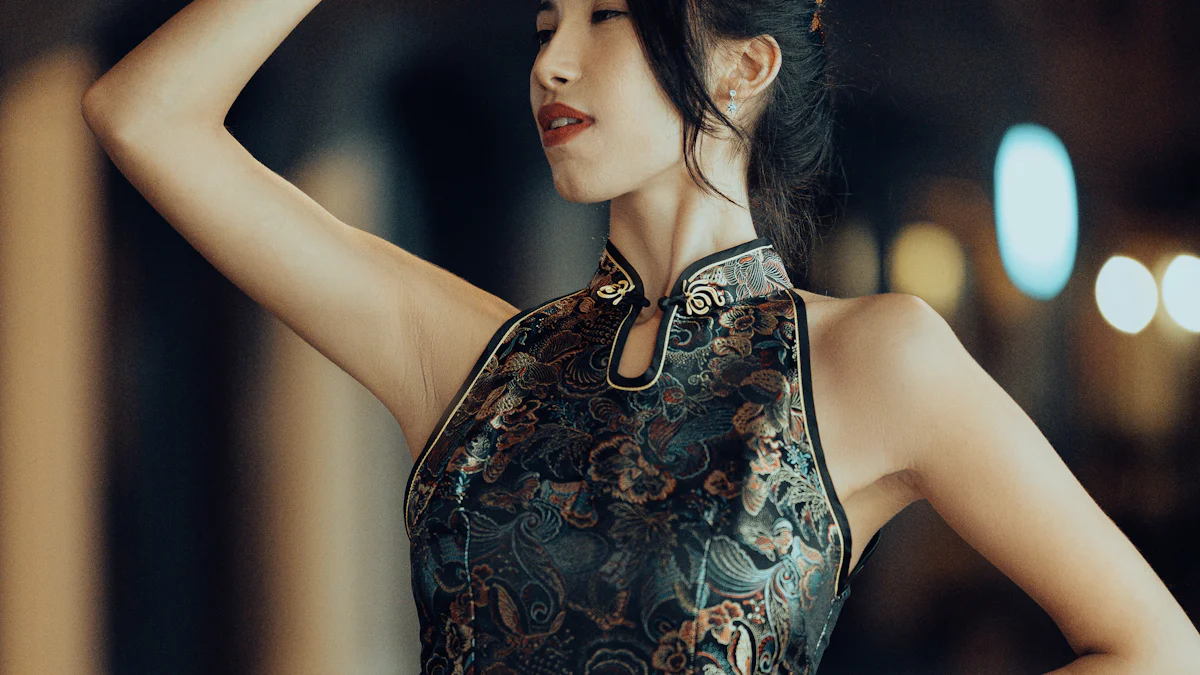
Cheongsam clothes hold a rich cultural heritage and timeless elegance. Originating in 1920s Shanghai, these garments quickly became a symbol of modern Chinese women. The cheongsam clothes evolved from loose robes to the fitted silhouette we recognize today, dominating Chinese fashion for decades. Despite facing challenges in the ’60s, they remain significant in history. This blog delves into their historical background, design elements, and modern adaptations to showcase their enduring legacy.
Historical Background

Origins of Cheongsam Clothes
During the early 20th century, the cheongsam clothes underwent a remarkable transformation influenced by Manchu-style clothing from the Qing Dynasty. Evolving from loose-fitting, layered robes to the more fitted and streamlined silhouette recognized today, the cheongsam clothes became a symbol of modern Chinese women. The Republican period marked the golden age of the cheongsam, where it gained immense popularity among females of all ages and social statuses, particularly upper-class women. This era saw significant changes in the style of cheongsams, making them more fashionable and aesthetically pleasing.
Role in Women’s Liberation
Following China’s Communist Revolution, the qipao faced a ban in China, leading to qipao tailors fleeing to Hong Kong where the tradition continued under the name cheongsam. Despite challenges, this iconic garment persisted in Singapore until the 1960s. Throughout the Modern China Era starting from 1949, the cheongsam clothes gained prominence in various forms of media and formal occasions. The dress accentuated femininity and sexuality while embracing daring designs with side slits that exuded confidence.
Design and Symbolism
Key Design Elements
Fabric and Patterns
The Cheongsam dress, known for its emphasis on femininity and modesty, showcases a variety of fabrics and intricate patterns. Silk, a traditional choice for Cheongsam dresses, exudes elegance with its smooth texture and luxurious sheen. The fabric drapes gracefully, accentuating the wearer’s silhouette and adding a touch of sophistication to the overall look. Intricate patterns such as dragons, phoenixes, and florals are commonly embroidered onto the fabric, symbolizing prosperity, grace, and beauty. These patterns not only enhance the visual appeal of the dress but also carry cultural significance, reflecting Chinese heritage and tradition.
Collar and Slits
The high collar of the Cheongsam dress has been refined over time to create an elongated neckline that exudes grace and poise. This design element adds a modern twist to the classic silhouette while maintaining the dress’s dignified modesty. The collar frames the face elegantly, drawing attention to the wearer’s features and enhancing their overall appearance. Additionally, the side slits of the Cheongsam dress serve both functional and aesthetic purposes. They allow for ease of movement while adding a hint of allure to the outfit. The slits reveal just enough skin to be subtly sensual without compromising on elegance, making them a signature feature of this iconic garment.
Cultural Symbolism
Representation of Femininity
The Cheongsam dress is more than just a piece of clothing; it is a symbol of femininity deeply rooted in Chinese culture. The form-fitting cut accentuates the curves of the female body, emphasizing gracefulness and elegance. By hugging the body in all the right places, the Cheongsam highlights femininity in a subtle yet powerful way. The sleek lines and tailored fit embody sophistication while celebrating women’s natural beauty. Wearing a Cheongsam is not just about dressing up; it is about embracing one’s femininity with pride and confidence.
Symbol of Grace and Strength
Beyond its representation of femininity, the Cheongsam dress symbolizes grace and strength—a harmonious blend of delicate beauty and inner resilience. The sleek silhouette conveys a sense of poise and dignity that transcends mere fashion trends. Each stitch in a Cheongsam embodies meticulous craftsmanship that reflects both physical strength (in its structure) and emotional resilience (in its enduring popularity). This garment serves as a reminder that true strength lies in embracing one’s vulnerabilities with grace while exuding confidence from within.
Modern Adaptations

Contemporary Fashion
In the contemporary fashion scene, the cheongsam has undergone a remarkable transformation to cater to the evolving tastes of modern women. The modern variations of this iconic garment have captivated fashion enthusiasts worldwide with their sleek and sophisticated designs. Designers have skillfully blended traditional elements with innovative cuts and styles, creating a fusion of classic elegance and contemporary flair.
Modern Variations
The modernized cheongsam style has embraced a slender and tight-fitting silhouette, resonating with the preferences of young women in cosmopolitan cities like Shanghai and Beijing. This updated design caters to the dynamic lifestyles of today’s women while preserving the essence of Chinese cultural heritage. Celebrities and high-class individuals have played a pivotal role in popularizing these modern variations by donning them at prestigious events, further solidifying the cheongsam’s status as a timeless fashion statement.
Global Influence
The global influence of the cheongsam extends far beyond its Chinese origins, captivating audiences on an international scale. Its ability to adapt to changing fashion trends while staying true to its traditional roots has garnered admiration from fashion connoisseurs worldwide. Western brands like Shanghai Tang have drawn inspiration from the vibrant colors and bold motifs of dragons and phoenixes that adorn traditional cheongsams, infusing these elements into their own collections. This cross-cultural exchange highlights the universal appeal and versatility of the cheongsam as a sartorial symbol that transcends geographical boundaries.
Cultural Celebrations
Amidst cultural celebrations and events, the cheongsam continues to shine as a symbol of elegance, grace, and tradition. Fashion shows and exhibitions dedicated to showcasing this exquisite garment attract enthusiasts eager to witness its timeless beauty on display.
Fashion Shows and Exhibitions
Fashion shows featuring the cheongsam serve as platforms for designers to reinterpret this classic attire through innovative perspectives. These showcases celebrate the intricate craftsmanship and artistic detailing that define each cheongsam, paying homage to its rich cultural significance. Exhibitions curated around the history and evolution of the cheongsam offer insights into its enduring legacy, captivating audiences with stories woven through threads of tradition.
Preservation of Tradition
Despite evolving with contemporary trends, efforts are underway to preserve the authenticity and craftsmanship associated with traditional cheongsams. Bespoke tailoring services rooted in heritage practices ensure that each garment retains its unique charm while adapting to modern sensibilities. The meticulous attention to detail by native artisans reflects a commitment to upholding centuries-old traditions, safeguarding the cultural heritage embodied by every stitch in these timeless creations.
By embracing modern adaptations while honoring age-old traditions, the cheongsam continues to captivate hearts globally as a cultural icon that transcends time and borders.
Recap of Cheongsam Clothes’ Significance:
- The intricate designs and comfortable cuts of Cheongsam Shoppe’s garments have captivated customers seeking understated elegance.
- Customers praise the shop for providing unique, well-made cheongsams that are perfect for special occasions.
Reflection on Their Enduring Legacy:
- The timeless allure of cheongsam clothes transcends generations, symbolizing grace and cultural heritage.
- The enduring legacy of these garments lies in their ability to blend tradition with modern sophistication seamlessly.
Future Prospects and Recommendations:
- Embracing innovation while preserving traditional craftsmanship will ensure the continued relevance and popularity of cheongsam clothes.
- To uphold their cultural significance, promoting awareness and appreciation of the artistry behind each garment is essential.






